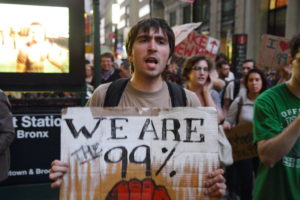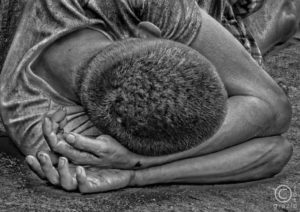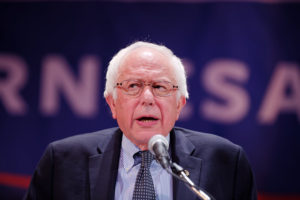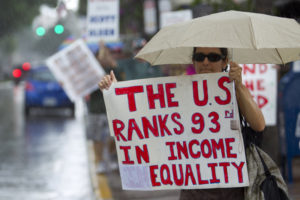U.S. Elections: A Poor Substitute for Democracy
The voting booth is a bust for the kinds of change most Americans want. We must create grass-roots movements that shake the nation to its foundations. African-American children gather near a voter registration booth in the early 1960s. (Kheel Center, Cornell University / Wikimedia)
African-American children gather near a voter registration booth in the early 1960s. (Kheel Center, Cornell University / Wikimedia)
The passivity of the American populace in the face of the endlessly outrageous presidency of Donald Trump is chilling to behold. There were some meaningful outbursts of mass anger over and against his patently discriminatory travel ban and against early Trump-led Republican efforts to throw millions of Americans off health insurance. Beyond those early protests, however, it’s been abject surrender for the most part.
There were no mass protests when President Trump embraced and advanced the greenhouse gassing-to-death of life on earth by pulling the United States out of the Paris Climate Accord or when Trump approved the ecocidal, planet-cooking Keystone XL and Dakota Access pipelines.
No mass marches rocked the nation when Trump advance-pardoned a convicted racist and fascist county sheriff (Joe Arpaio) who created deadly open-air “concentration camps” (Arpaio’s own proud term) to detain suspected undocumented immigrants of Latino background.
The streets stayed silent when Trump defended neo-Nazis and other vicious white nationalists, offering them dog-whistle encouragement after they marched and killed in defense of Confederate (slave power) war statues.
Nobody marched on the White House when Trump threatened genocidal and thermonuclear war (“fire and fury”) on North Korea, putting millions of lives at risk on and around the Korean Peninsula.
Trump’s remaking of the federal bench in the image of the hard-right Federalist Society has yet to elicit significant mass protest. The same goes for Trump’s brazen killing of thousands of civilians in Iraq and Syria, his support for Saudi Arabia’s U.S.-equipped devastation of Yemen, his epic bungling of Puerto Rican disaster relief, and the numerous insults he hurled at Puerto Rico in the wake of Hurricane Maria.
Trump’s moronic and arch-nativist wall to be built on the southern U.S. border has failed to spark mass resistance. Neither has his push for an openly plutocratic tax cut that will make the already obscenely hyper-opulent U.S. superrich even more grotesquely wealthy—this even as the top 10th of the upper 1 percent in the U.S. already possesses as much wealth as the bottom 90 percent, and half the U.S. population is poor or near poor.
The passivity of the citizenry in the face of all this and more is particularly chilling when seen against the progressive, social-democratic and left-leaning profile of majority U.S. public opinion. As the left-liberal magazine In These Times reported three days before Trump’s inauguration, a “broad consensus … has emerged in the United States around progressive policies.” The progressive consensus, author Theo Anderson noted, “cuts across economic and social issues and includes even traditional culture-war flashpoints. On most policy questions, polling shows that about three-fifths or more of the public prefers progressive positions.” The nation’s all-too-silent progressive majority supports federally funded universal national health insurance, progressive taxation, collective bargaining rights, campaign finance reform, a higher minimum wage, free child care, legalized marijuana, abortion rights, LGBT rights, and a shift from fossil fuels to renewable energy.
An October CNN poll showed that just a third (34 percent) of Americans support Trump’s tax cuts, whereas 52 percent oppose them and 14 percent are unsure. Only 24 percent agree with Trump and his Republican allies that the cuts will make families “better off if they are passed.” An October CBS poll found that 58 percent of Americans believe the Trump tax “reform” favors the wealthy, with just 19 percent believing it “treats everyone equally” and a mere 18 percent agreeing that it “favors the middle-class.”
Surely, this graphic chasm between majority citizen wishes and government policy is the stuff revolutions, or at least great social protest and resistance movements, are made of in nations claiming to be democracies, yes? Not in the contemporary U.S., where the populace is staying off the streets and out of social movements for the most part.
“We the people” have other, supposedly more urgent and meaningful things to do with our lives than joining together to confront a corrupt and sociopathic right-wing government that brazenly defies majority sentiment by pushing for an ever-increasing concentration of wealth, for more racist mass incarceration, for a deepening decimation of the public sector, for the removal of millions of poor and sick people from health coverage, for the right-wing takeover of the judiciary, for the shift of yet more taxpayer money to the nation’s giant war machine, and for the accelerated ruination of livable ecology.
What gives? Part of the problem is that the disconnect between majority opinion and policy is anything but novel. It’s hardly restricted to the Trump era. It’s a long-standing and richly bipartisan phenomenon. As the distinguished liberal political scientists Benjamin Page (Northwestern University) and Marin Gilens (Princeton) show in their important new volume “Democracy in America?”:
[T]he best evidence indicates that the wishes of ordinary Americans actually have had little or no impact on the making of federal government policy. Wealthy individuals and organized interest groups—especially business corporations—have had much more political clout. When they are taken into account, it becomes apparent that the general public has been virtually powerless. … The will of majorities is often thwarted by the affluent and the well-organized, who block popular policy proposals and enact special favors for themselves. …
This is equally true regardless of which of the two dominant political organizations hold nominal power in the executive and/or legislative branches, as Page and Gilens show.
It’s been going on for decades, and it has conditioned millions of Americans to give up on politics altogether. “Voters feel, rightly,” Anderson wrote, “that their voices don’t count. They become more cynical and disengage.” It’s nothing new.
Another and related factor is the dogged hold in U.S. political culture of the notion that the time for meaningful popular say on matters of policy is during the biennial elections that are sold to the populace as the only and real politics that matter. Again and again, people are told that going into a two-(capitalist-)ballot box for two minutes once every two or four years is a great and glorious exercise in popular self-rule. “Rejoice, citizens,” the U.S. wealth and power elite, its ubiquitous commercial media and its many highly indoctrinated intellectuals tell the people, “you get/had your participation on Election Day. Thank a military veteran.”
Nine years ago, then-Vice President Dick Cheney had an interesting response when ABC News’ Martha Raddatz told him recent polls showed that two-thirds of the U.S. populace thought the war in (on) Iraq was “not worth fighting.”
Cheney smiled as he replied, “So?”
“So … you don’t care what the American people think?” Raddatz pressed.
“No,” Cheney elaborated. “I think you cannot be blown off course by the fluctuations in public opinion polls.”
Justifying Cheney’s blunt remarks shortly afterward, White House spokeswoman Dana Perino was asked if the citizenry should have input on U.S. policy. “You had your input,” Perino proclaimed. “The American people have input every four years, and that’s the way our system is set up.”
The great majority of Americans technically disagreed. Fully 94 percent of U.S. citizens at the time said that government leaders should pay attention to the views of the public between elections.
But so what? Telling pollsters you think something should be done is one thing. Acting to bring it about is something else. After some early and giant anti-war marches, the U.S. populace launched no serious great rebellion against the Bush-Cheney regime and its monumentally illegal, mass murderous invasion and occupation of Iraq. It fell back into the standard time-staggered position of electoralist default. The citizenry qua electorate tolerated the mind-boggling Iraq crime and many other Bush administration transgressions, falling prey twice in a row to the docility-inducing illusion of progressive change through presidential elections. The spectacular, multicolor 2008 election pageant delivered a culturally rebranded corporate state and empire, with Wall Street’s privileges intact and America’s vast global military machine still set on “Kill” under the “imperial grandmaster” and surveillance champion Barack Obama.
Some political scientists argue that regular elections that generate competitive contests for citizen votes are all that is required for a nation to be a democracy. They are dead wrong. “Elections alone,” Page and Gilens note, “do not guarantee democracy.” That is an understatement.
“Democracy in America?” shows that majority opinion is trumped by a deadly complex of forces in the U.S.: campaign finance, candidate selection, lobbying and policy. Powerful and wealthy individuals, corporations and interest groups set the agenda for the special primary-election influence of extreme party activists. We also have the disproportionately affluent, white and older composition of the active (voting) electorate, the manipulation of voter turnout, the widespread dissemination of “distracting, confusing, misleading, and just plain false information,” unrepresentative political institutions (the Electoral College, the unelected Supreme Court, the over-representation of the predominantly white rural population in the U.S. Senate, and one-party rule in the House), constitutional and related partisan gridlock, and the fragmentation of authority in government.
Mammon reigns. American “public” policy, Page and Gilens write, “reflects the wishes of those with money, not the wishes of the millions of ordinary citizens who turn out every two years to choose among the preapproved, money-vetted candidates for federal office.”
Page and Gilens leave out much that is central to the problem of how the rich rule America. They say nothing about the rise of a lethal and ubiquitous police, prison and surveillance state inside the U.S. (The story of government repression of the Occupy Wall Street Movement, and of earlier left and anti-plutocratic movements, is missing from their volume.) The intimately related problem of the giant U.S. military state and global empire (great forms of upward wealth distribution and authoritarian power) is glaringly absent. The critical and ongoing historical roles of racial and ethnic division and “divide and rule” are barely touched upon. Also omitted are the critical ideological and propagandistic, consent-manufacturing roles of the corporate media and the capture of the nation’s educational system by the corporate and financial elite.
Another key omission in “Democracy in America?” is the workplace. As the radical economist Richard Wolff reminds us, ordinary working-class and working-age Americans spend most of their waking lives on the job, under the authoritarian and often despotic supervision of employers. Until its workers own, direct and structure their own workplaces as “associated producers,” democratically determining the purpose and nature of their productive activities and appropriating the surplus generated for themselves and the broader common good, it is difficult to think of a society as meaningfully democratic.
Capitalism and democracy have long stood in fundamental opposition to each other—a problem that does not engage Page and Gilens.
Still, their book is a devastating indictment of the inner plutocratic workings of an elections system that is falsely trumpeted as an unmatched model of popular self-rule. If the book’s findings were properly appreciated, disseminated and discussed, Americans might focus less on elections and candidates and more on building the kinds of great grass-roots, sociopolitical movements that have shaken the nation to its foundations and shifted its direction in the past. The Congress of Industrial Organizations, the Southern Christian Leadership Council, the Student Nonviolent Coordinating Committee, and the anti-Vietnam War movement hardly waited for election dates and the sympathy of politicians to change things. They undertook powerful non-electoral direct actions like the sit-down strike wave of 1936-37, the courageous lunch counter sit-ins and Freedom Rides of 1960-62, and the many mass mobilizations for peace that occurred in the 1960s and early ’70s. Slaves and abolitionists didn’t wait for the 1864 presidential election to force President Lincoln’s hand (along with the Confederacy’s early military victories in the Civil War) on emancipation.
“The really critical thing,” the great American radical historian Howard Zinn noted after George W. Bush was first installed in the White House, “isn’t who’s sitting in the White House, but who is sitting in—in the streets, in the cafeterias, in the halls of government, in the factories.”
As Zinn elaborated in an essay on and against the “Election Madness” he saw “engulfing the entire society including the left” in the year of Obama’s ascendancy, an “election frenzy seizes the country every four years because we have all been brought up to believe that voting is crucial in determining our destiny, that the most important act a citizen can engage in is to go to the polls. …” Zinn acknowledged that he probably would support one major-party candidate over another “for two minutes—the amount of time it takes to pull the lever down in the voting booth.”
But then he said the same thing as Dick Cheney, but with a very different meaning: So what? “Before and after those two minutes,” Zinn wrote:
[O]ur time, our energy, should be spent in educating, agitating, organizing our fellow citizens in the workplace, in the neighborhood, in the schools. Our objective should be to build, painstakingly, patiently but energetically, a movement that, when it reaches a certain critical mass, would shake whoever is in the White House, in Congress, into changing national policy on matters of war and social justice. … We should not expect that a victory at the ballot box in November will even begin to budge the nation from its twin fundamental illnesses: capitalist greed and militarism. … Before [elections] … and after … we should be taking direct action against the obstacles to life, liberty, and the pursuit of happiness. … Historically, government, whether in the hands of Republicans or Democrats, conservatives or liberals, has failed its responsibilities, until forced to by direct action: sit-ins and Freedom Rides for the rights of black people, strikes and boycotts for the rights of workers, mutinies and desertions of soldiers in order to stop a war. Voting is easy and marginally useful, but it is a poor substitute for democracy, which requires direct action by concerned citizens.
This is why I resisted the temptation to be awestruck by the remarkable outpouring of Americans who protested the inauguration of Donald Trump in January. Cable news talking heads marveled at the marches, calling them the “biggest social movement since the 1960s.” But what were those massive but polite, pink-hatted marches all about? While many of the chants and signs heard and seen at the historic marches indicated policy concerns, the clear and simple thing that had put millions in the streets was the awful man who is now sitting in the White House. It was about an election outcome. The new president hadn’t even made any policy yet. What he’s actually done as president has yet to generate protests remotely on the scale of the ones sparked by the Awful One’s entrance into the Oval Office.
Most of the millions who hit the streets to voice outrage against the election of Trump would have stayed home if it had been the dismal arch-corporatist and “lying neoliberal warmonger” Hillary Clinton being inaugurated. And that is very telling. As Chris Hedges noted in the summer of 2016:
The predatory financial institutions on Wall Street will trash the economy and loot the U.S. Treasury on the way to another economic collapse whether Donald Trump or Hillary Clinton is president. Poor, unarmed people of color will be gunned down in the streets of our cities whether Donald Trump or Hillary Clinton is president. The system of neo-slavery in our prisons, where we keep poor men and poor women of color in cages because we have taken from them the possibility of employment, education and dignity, will be maintained whether Donald Trump or Hillary Clinton is president. Millions of undocumented people will be deported whether Donald Trump or Hillary Clinton is president. Austerity programs will cut or abolish public services, further decay the infrastructure and curtail social programs whether Donald Trump or Hillary Clinton is president. Money will replace the vote whether Donald Trump or Hillary Clinton is president. And half the country, which now lives in poverty, will remain in misery whether Donald Trump or Hillary Clinton becomes president. This is not speculation. We know this because there has been total continuity on every issue, from trade agreements to war to mass deportations, between the Bush administration and the administration of Barack Obama. … The problem is not Donald Trump. The problem is capitalism. And this is the beast we are called to fight and slay. Until that is done, nothing of substance will change. … To reduce the political debate, as [Bernie] Sanders and others are doing, to political personalities is political infantilism. We have undergone a corporate coup. Donald Trump and Hillary Clinton will not reverse this coup. They, like Barack Obama, know where the centers of power lie. They serve these centers of power.
The dysfunctional overfocus on who’s sitting in the White House—yes, the horrific Boss Tweet—is sustained between the quadrennial election spectacles by the cable news talking heads and the late-night comedians, for whom Trump is a gift that keeps on giving. It is fed by hopes for impeachment on grounds of collusion with Russia in the subversion of our supposed great democratic electoral process.
All the evils that Hedges mentions would survive the impeachment and removal of Trump. Nothing of substance would change.
Zinn and Hedges’ wise words belong in the front of the minds of all citizens and workers who want to see democracy break out and take hold at long last in the oligarchic United States. They help us keep our eyes on the real prize: changing policy in a progressive direction and radically restructuring society beneath and beyond the biennial and quadrennial big-money, major-media, candidate-centered “electoral extravaganzas” (Noam Chomsky) that are sold to us as politics, “the only politics that matters.”
Zinn and Hedges’ counsel also help keep us on guard against the parasitic army of Democratic Party politicos who are constantly working to stick their poisonous claws into social movements. Beneath their deceptive language of “resistance,” the “progressive” politicos’ underlying agenda is always to channel genuine popular resistance into narrow get-out-the-vote efforts for Democratic candidates. Their mission is to drown social movements in the icy waters of major-party political calculation and the endless dollar-drenched and candidate-focused “Election Madness.” (See anti-war activist and attorney Phillip Crawford’s remarkable account titled “Whatever Happened to the Trump Resistance?” on how the Democratic Party front-group Indivisible played this role earlier this year in Monterey County, Calif.). They are snake oil salesmen hawking the false belief that we can win progressive change by “turning out every two years to choose among the preapproved, money-vetted candidates” (Page and Gilens).
The sooner we develop a different and more Zinnian politics—one concerned less with who’s sitting in the White House (and Congress and state government) than with who’s sitting in the streets, shop floors, offices, halls of government—the sooner we’ll have a chance of getting on the path to a decent and democratic future.
Your support matters…Independent journalism is under threat and overshadowed by heavily funded mainstream media.
You can help level the playing field. Become a member.
Your tax-deductible contribution keeps us digging beneath the headlines to give you thought-provoking, investigative reporting and analysis that unearths what's really happening- without compromise.
Give today to support our courageous, independent journalists.






You need to be a supporter to comment.
There are currently no responses to this article.
Be the first to respond.